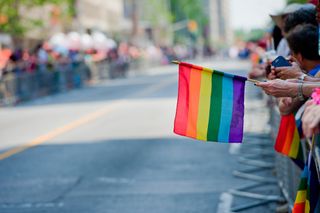Global Survey Reveals That Acceptance of Gay People Lags in 3 Regions

SEATTLE — The acceptance of gay rights has undergone an unprecedented worldwide surge in recent years, with governments granting gay people the right to marry and protections from discrimination. But that's not the case everywhere, largely because of unyielding local cultures that thwart pro-gay global views, new research finds.
These anti-gay cultures are especially prevalent in three world regions: the Muslim world, the former Soviet Union and Eastern Bloc, and sub-Saharan Africa, said study researcher Louisa Roberts, a doctoral candidate in sociology at The Ohio State University.
"Even as there's been this push toward acceptance of homosexuality at the global level, you have resistance at various regional levels," Roberts told Live Science. [5 Myths About Gay People Debunked]
Roberts based much of her work on two enormous datasets: the integrated World Values Survey and the European Values Survey. Using data collected from 1981 to 2012, Roberts examined how people's views on homosexuality changed over time.
In all, she looked at data from 87 countries, with an average sample size of about 1,600 people per country. In particular, she looked at a question asking participants how justifiable they thought homosexuality was on a scale from 1 to 10, with 1 being "never justifiable" and 10 being "always justifiable."
For example, in 1981, Japan had an average score of 2.51, the United Kingdom 3.40, Australia 3.78 and the Netherlands 5.60. In 1982, the United States had an average score of 2.36.
However, by 2009 and 2010, Japan had an average score of 5.14 and the United Kingdom 5.50. In 2011, the United States had 5.40. In 2012, Australia had 6.86 and the Netherlands 7.90.
Sign up for the Live Science daily newsletter now
Get the world’s most fascinating discoveries delivered straight to your inbox.
These numbers indicate "that there has been a global upswing in the global acceptance of homosexuality," Roberts said.
But the averages for countries in the Muslim world (which includes much of the Middle East, parts of North Africa and several Southeast Asian nations) and sub-Saharan Africa stayed under 2.0, and averages for the former Soviet Union and Eastern Bloc countries stayed under 3 for the entirety of the survey, Roberts found.
Acceptance surge
People living in different regions of the world changed their perceptions on homosexuality in various ways, Roberts found. For instance, countries that were more accepting of gay people in 1981 showed the largest positive changes in acceptance over time, Roberts said.
Those nations who were less accepting changed their perceptions more slowly, which widened the gap between those areas and the more accepting countries, the research showed.
This general increase in acceptance in much of the world occurred for a number of reasons, but several large ones stand out, Roberts said.
In Europe, countries began to decriminalize homosexuality in the 1960s and 1970s, and a "veritable gush" of these laws passed in the 1990s. In 1994, the United Nations Human Rights Committee ruled that criminalizing homosexuality violated the U.N. International Covenant on Civil and Political Rights. By 2012, employment discrimination was prohibited in 59 countries and same-sex civil unions or marriages were made legal in 24 countries.
On the medical front, the American Psychiatric Association said in 1973 that it no longer classified homosexuality as a mental disorder, and the World Health Organization followed suit in 1990.
The globalized media also played a role, by promoting "both the acceptance of homosexuality and the conceptualization of homosexuality as an identity, not just a behavior," Roberts said. [10 Milestones in Gay Rights History]
Countries in which people were more exposed to global ideas, telecommunication and travel, in general, as well as countries whose citizens received more education, on average, tended to become more accepting of gay people over time, the research showed.
Exposure to global ideas and education levels were low in the three regions that did not grow in their acceptance of homosexuality, the researchers found. What's more, these regions' cultures resisted gay acceptance. For instance, in 2013, Russia passed a law against so-called "homosexual propaganda." Muslim governments have rejected homosexuality "as a decadent Western import," and many African leaders have decried homosexuality as contrary to "African values" and traditions, Roberts said.
About two-thirds of the 76 countries that still criminalized homosexuality in 2012 were in sub-Saharan Africa or Muslim-majority nations, the research showed.
The study was presented on Saturday (Aug. 20) at the American Sociological Association's annual meeting in Seattle. The research has not been published in peer-reviewed journal.
Original article on Live Science.

Laura is the archaeology and Life's Little Mysteries editor at Live Science. She also reports on general science, including paleontology. Her work has appeared in The New York Times, Scholastic, Popular Science and Spectrum, a site on autism research. She has won multiple awards from the Society of Professional Journalists and the Washington Newspaper Publishers Association for her reporting at a weekly newspaper near Seattle. Laura holds a bachelor's degree in English literature and psychology from Washington University in St. Louis and a master's degree in science writing from NYU.
Most Popular




